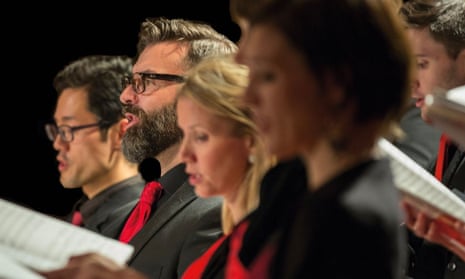They were gathered up to 3,000 years ago, but the 150 songs that became the Hebrew Tehillim and then the Old Testament’s Book of Psalms – songs about abandonment, powerlessness and suffering – are as relevant today, in a world marked by refugees, oppression, hastily erected barriers and closed minds, as they were then.
And over four days at this year’s Adelaide festival, the songs, many composed or reconceived by contemporary Australian and international songwriters, will be presented at 12 a capella concerts hosted in places of worship – the fourth iteration of an international project aiming to breathe new life into them.
Tido Visser, the artistic director of the Netherlands Chamber Choir and the driving force behind the 150 Psalms project, says the songs are still relevant in today’s secular society. The texts “came across to me as if they were written yesterday”, he says.
“They were about me. About my own hope, about my wife’s joy, my son’s comfort, my friend’s sadness. But even more than that, they dealt with what fills the newspapers … the disappointed voter, the refugee’s fear, the oligarch’s greed, the leader’s tyranny”.

The concerts – performed by Australia’s Song Company, alongside the Tallis Scholars of England, Netherlands Chamber Choir and the Norwegian Soloists Choir – group psalms together according to themes, such as Justice, Abandonment, Safety and Suffering. Thinkers and writers will be speaking on the theme before each event, in a lineup that includes Kerry O’Brien, Rebecca Huntley and Nam Le.
For New Zealand-born composer Clare Maclean, who lives in Penrith in Sydney’s west, it was an opportunity to bring empathy to those facing injustice, such as asylum seekers.
For her work, which will be performed by the Song Company in the Justice concert on 29 February, she borrowed one melody from Psalm 11 – on turmoil and injustice – and another from a Jewish liturgical poem (a piyyut), expressing longing for home among exiles.
“In our contemporary world, where there is so much displacement of people and so much violence, this is really current,” she says – adding that music allows people to “somehow touch or sense the numinous” whether they have a religious faith or not.
The four concerts will be accompanied by an exhibition of photojournalism, featuring work “specifically chosen to encapsulate the spirit of a particular psalm lyric” – including photographs of refugees at sea. Maclean says the invisibility of asylum seekers under Australia’s offshore detention regime reduces the public’s ability to empathise. “Denying media access is the sort of thing you expect dictatorships to do,” she says.
“I’m personally appalled by the fact that our government is behaving like a dictatorship, and [by] the misinformation – it is not illegal to seek asylum – and the mental torture that people have gone through,” says Maclean. “It makes you ashamed to be Australian.”

Another Sydney classical composer, Elena Kats-Chernin, has a special chord that she often uses when writing about suffering: F Minor 7. When Adelaide festival commissioned her to write a four-minute setting for Psalm 13 for the Suffering concert on 1 March, to be performed by the Netherlands choir, she employed the chord while shifting the sacred song’s original emphasis from the religious to the personal.
“I want it to resonate with people independent of faith or religion or belief,” she says. Kats-Chernin is Jewish but “not particularly religious”. Rather than a biblical David imploring his savior, “How long O Lord will you forget me?”, she has explained to the choir that they might imagine this as a “love song of a left-behind lover”.
Kats-Chernin was born in Tashkent in the then-Soviet Union, and migrated to Australia for a better life at 17. For her contribution, she imagined emotional and social suffering rather than physical pain: “I saw a person being left alone, by the whole society.”
She hopes her work can help promote empathy. “I’ve been looking at the refugee story,” she says. “It’s absolutely harrowing. The suffering. I’m just trying to imagine if I was that person. The darkest, blackest despair one has, it’s just heartbreaking.”
Tido Visser says the texts used in the psalms come from a time when the “fierce distinctions between religions were not so existent as they are now”. Their messages, he says, have often been disregarded.
“Choral music has such a unifying power,” he says. “When you are a child and looking at the stars, you think you’re a tiny little minuscule particle in a huge universe. What I hope you get out of the experience of listening to this music is a sense of the strength and feeling part of an amazing species; to think, ‘Why do we choose to do so much wrong, and why don’t we choose to do right?’
“If you look at the function of the arts, in a broader perspective, we make people think. We have an obligation to make people think, especially in these times.”
Kats-Chernin says she was “greatly upset” by the recent downgrading of the arts by Australia’s Morrison government – who rolled it into a portfolio with roads and rail, and dropped “arts” from the title.
“Arts is still seen as frivolous, unnecessary, something that you don’t need,” she says. “Just try living without the arts. Can you just imagine? Not having any music of any kind anywhere. Theatre. Film. Everything disappears.”
